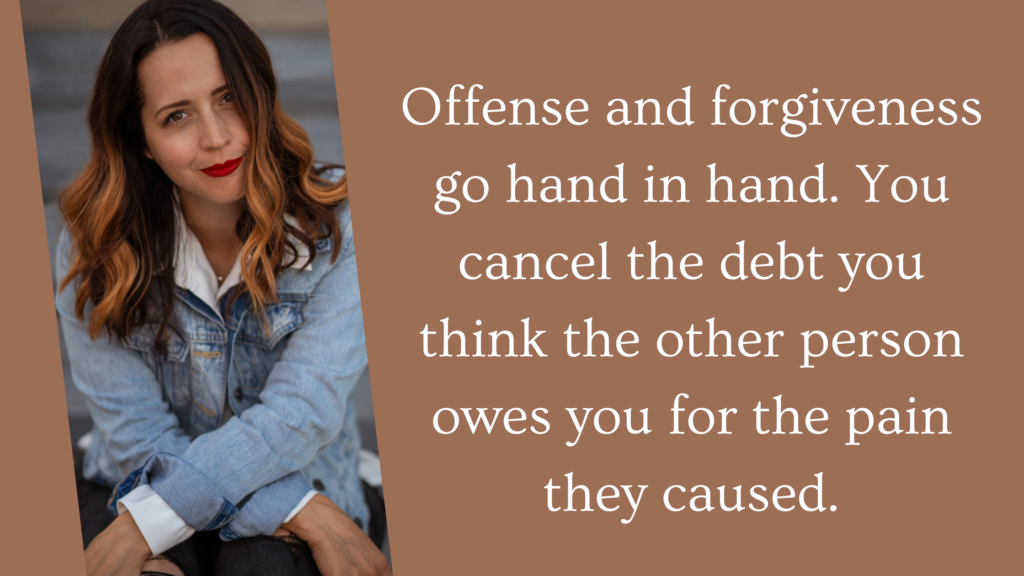I know what it’s like to ask for help, to feel the pain, and to want someone to listen. Holding an offense was something I was good at. But today, we’re talking about what the Bible says about being offended.
I know what it’s like for that pain not to be heard, which only drove me to bear more offenses because I didn’t think anyone cared.
My heart didn’t need another to-do list or Bible verse to memorize.
I didn’t feel there was a safe place for my feelings to land or be held, which left me feeling alone, isolated, and like I was the only one picking up the pieces of my pain.
The outcast. The one who didn’t grow up in church and lost her virginity at a young age. The one who made her body an idol and did anything for a man to love or notice her. The one with the dark past.
Friend, I know what it’s like to feel like a burden to those around you and how easily that burden can turn into offense. You are upset and outraged by the lack of love you feel from those who are supposed to love you the most.
But you will never be a burden to God. You can not exhaust or empty His love for you.
God isn’t asking you to have it all together, to right your wrongs, or to try and do it all by yourself.
He’s inviting you to the table.
He’s welcoming the pain and the offense.
In today’s society, getting offended by something someone says or does is easy. But as Christians, it’s important to understand what the Bible says about being offended. In this blog post, we’ll explore some key scriptures and lessons from the Bible on how to respond when we feel offended.
By the way, what if I told you your feelings aren’t inherently bad or sinful? You don’t need to fear or suppress them. They can be a guide. If you’re interested, I have a free 3-day study on living by faith while processing emotions. Check it out here!
What Does the Bible Say About the Spirit of Offense/Being Offended
The spirit of offense is mentioned several times in the Bible, particularly in the New Testament. According to scripture, the spirit of offense is a negative influence that causes people to be easily offended, resentful, and bitter. This spirit can divide and disrupt communities and relationships, and it often stems from a lack of humility, forgiveness, and love.
The Bible refers to the spirit of offense as a spirit that is easily upset or disheartened by the actions or words of others, causing resentment and bitterness. It is often associated with a lack of forgiveness and a negative attitude towards others.
In Matthew 18:7, Jesus says, “Woe to the world because of offenses! For offenses must come, but woe to that man by whom the offense comes!” This verse highlights the importance of avoiding causing offense to others and avoiding being easily offended ourselves.
1 Corinthians 13:5 also mentions the importance of love in overcoming the spirit of offense, stating, “Love bears all things, believes all things, hopes all things, endures all things.” This verse reminds us that true love is characterized by an ability to bear with one another, even when we are wronged, and to remain hopeful and enduring, even in the face of offense.
What Does the Bible Say About Being Offended or Offense
The Bible has many verses that address the topic of offense and being offended. Here are a few key verses:
Matthew 18:21-22, “Then Peter came to Jesus and asked, “Lord, how many times shall I forgive my brother or sister who sins against me? Up to seven times?” Jesus answered, “I tell you, not seven times, but seventy-seven times.”
Proverbs 19:11, “A person’s wisdom yields patience; it is to one’s glory to overlook an offense.”
Matthew 5:38-39, “You have heard that it was said, ‘Eye for eye, and tooth for tooth.’ But I tell you, do not resist an evil person. If anyone slaps you on the right cheek, turn to them the other cheek also.”
1 Peter 4:8, “Above all, love each other deeply, because love covers over a multitude of sins.”
Colossians 3:13, “Bear with each other and forgive one another if any of you has a grievance against someone. Forgive as the Lord forgave you.”
These verses show that the Bible emphasizes the importance of forgiving others and not holding onto resentment and bitterness. Offending or being offended can be a natural part of human relationships, but the Bible encourages us to forgive and extend grace towards others, as Jesus has done for us.
Tired of carrying the weight of offense? Learn more about my growth-focused coaching program!
What Does the Bible Say About Handling Being Offended
Here are some steps that can help one not take offense:
Practice self-awareness: Take the time to reflect on what triggers you and what your tendencies are when you feel defensive. Understanding yourself better can help you to recognize when you might be in danger of taking offense.
Cultivate a life-giving objective perspective: Instead of focusing on the negative, focus on the positive aspects of the situation. This can help to shift your perspective and reduce your tendency to take offense.
Use empathy: Try understanding the other person’s perspective and the reasons behind their behavior or words. This can help you to see things from their point of view and not take things personally.
Practice forgiveness: Forgiving others is key to not taking offense. Holding onto resentment and anger only harms you and can lead to deeper feelings of offense.
Seek support: Surround yourself with supportive people who can encourage and uplift you when you feel offended. A supportive network can help you manage your emotions and not take offense. You know I love and am all about being in community with others.
Practice gratitude: Thank God for the good and praise Him in (not for) the not-so-good. Focus on the blessing. This can help you not take things for granted and keep things in perspective.
These steps can help you to develop resilience and not take offense, even in challenging situations. It takes time to learn what the Bible says about being offended. It takes practice, but over time you can learn to handle offense in a healthier way and maintain positive relationships.

What Does the Bible Say About Letting Go of Offense
To begin to break the bondage that offense has kept you is to embrace true forgiveness.
When we lean on God for strength and support we know we can be honest with Him because nothing is hidden from Him.
First, let us get honest about the offense in our hearts. When the bible talks about being offended, it comes from the Greek word for “bait.” The enemy will try to bait you with your pain to get you stuck in the offense. Regardless of the words or what is said, we can hand over the offense to God.
Second, forgiveness begins to release the pain you hold and carry because you are no longer the one trying to make it right. We know God knows our pain, but He is a gentleman. He isn’t going to beg you nor plead with you to give it to Him. It’s our choice to do so.
Third, you will have to repeat this over again. It’s not that we say we forgive, and it all goes away. Since what happened, happened to all of you, there will be time for the emotional and physical wounds to heal. Therefore, we will have to continue to walk out the process of forgiveness. However, we must initiate and release.
Offense and forgiveness go hand in hand. You cancel the debt you think the other person owes you for the pain they caused.
It’s at the table where we meet with Jesus for our feelings to be heard, seen, and handled with care. When the bible talks about being offended and how to let go it’s for our protection and relationship with Jesus.
Because in His presence is when we become transformed by His love which empowers us to walk with courage.
Jesus is the wisdom of God and the word of God. He is the physical manifestation of God’s love, who is now with you.
Remember: As adults, we can experience emotional healing whether someone recognizes our pain or not. Our next course of action will vary depending on circumstances and how God’s Word speaks to us about the particular situation we bring to Him. But there is always an invitation from the Father to tend to the broken pieces of our life because He knows us better than anyone else.
Resources on Offense:
Rooting for you,







Greattttt article just in time!
Thanks for reading!
Thoroughly amazing reminder what would Jesus do?
Thank you!
Wonderful articulate summary review! Culminating in the great gift of forgiveness! And distinguishing that nuance, between personal, private, inner, and relational, expressed.
In 08 i proposed a national day of forgiveness to a forgiveness ministry. Nothing came of it. It would still be an appropriate timely thing?
Thank you for your well-researched and informative expressed faith-full presents.
The just shall “live” by “lifestyle” of faith!
I am glad this helped!